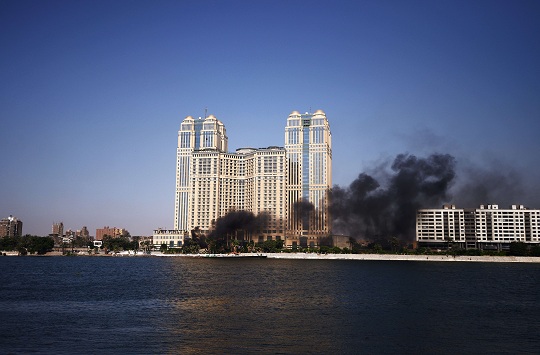CAIRO: Under the majestic dome of Cairo University’s grand hall on Thursday, US President Barack Obama’s gave his uplifting address to the Muslim world, meeting heightened expectations and his own aims.
No doubt Obama’s main objective was to improve the image and perception of the US in Muslim-majority countries and among the American-Muslim community, which in itself is worthy of respect.
Following almost a decade of condescending, high-handed and aggressive language by previous US administrations that has seriously damaged Western-Muslim relations, Obama’s rhetoric comes as a long-awaited reprieve, breathing hope for a better future in the region economically, politically and socially.
From the onset, Obama answered critics who projected that his much-hyped speech was no more than a publicity stunt, a distraction to cover up the US’s global hegemony, using soft power and the popularity ratings of it’s charismatic president to win over Arab and Muslim hearts and minds as America continued to bomb Afghanistan, occupy Iraq and unequivocally support Israel’s occupation of Palestine.
Keenly aware of the complexity of his task, Obama used just the right language, and more importantly, seemed to harbor the genuine sentiments to reverse that image.
“No single speech can eradicate years of mistrust, nor can I answer in the time that I have all the complex questions that brought us to this point, said Obama. “But I am convinced that in order to move forward . There must be a sustained effort to listen to each other. America is not the crude stereotype of a self-interested empire. The United States has been one of the greatest sources of progress that the world has ever known. We were born out of revolution against an empire. We were founded upon the ideal that all are created equal, and we have shed blood and struggled for centuries to give meaning to those words . We are shaped by every culture, drawn from every end of the Earth, and dedicated to a simple concept: E pluribus unum: “Out of many, one.
Pundits still say that they would like to see more than lip service, that actions speak louder than words. Of course they are right, but at the same time no one can deny the revolutionary potential for change in the US’s approach to the region brought by Obama’s first step to end “the cycle of suspicion and discourse .
Speaking of equality and mutual respect, Obama implicitly admits that they have been lacking in the past and promises that this will change in the future as the US extends its hand in peace to turn a new page.
“Words alone cannot meet the needs of our people. These needs will be met only if we act boldly in the years ahead; and if we understand that the challenges we face are shared, and our failure to meet them will hurt us all, he said, to overwhelming applause.
In the next few days newspaper columns and TV shows will be dedicated to analyzing Obama’s speech and the world’s reaction to it. But people are always divided over iconoclasts who are not afraid to call a spade a spade.
While some Arab critics have already taken him to task for what they felt was the typically skewed US attitude towards the Israeli-Palestinian conflict when he spoke of “the tragic history of the Jewish people and spoke at length about the Holocaust, yet mildly referred to the suffering of the Palestinians in pursuit of a homeland and the “pain of dislocation . He has also been criticized for calling on the Palestinians to abandon violence, without making even a remote mention of Israeli violence, thus in a way equating the victim with the aggressor.
Although their critique is absolutely legitimate, it fails to note that Obama squarely condemns the “daily humiliations that come with “occupation in Palestine, using a term never used by a US administration to describe the actions of the Israeli state. Obama’s insistence on a complete moratorium on Israeli settlements (“The United States does not accept the legitimacy of continued Israeli settlements. This construction violates previous agreements and undermines efforts to achieve peace, he said) has been dubbed by the US media as one of the harshest messages the US has ever sent to Israel and has been perceived by Israeli settlers as a direct threat to their existence.
As far as he could, Obama condemned the humanitarian crisis in Gaza – true that he spoke of it within the prism of Israeli security, but still it is a significant step towards underlining a renewed US commitment to broker a fair peace in the region. “America will not turn our backs on the legitimate Palestinian aspiration for dignity, opportunity, and a state of their own, he said.
Pundits say that this was all said before and that goodwill alone will not stop the suffering or end the occupation. To that, I would agree, but would add that when Obama says it, it sounds different and it feels different.
He has already taken active steps towards proving his commitment to the cause of peace, but he’s not a magician, he won’t cast a spell and suddenly everyone will kiss and make up.
What he did achieve was send a tough message to an intransigent right-wing Israeli administration at a time when the Palestinians are fighting each other and the Arab world has failed to put its collective weight behind a single peace initiative which makes the US’s role doubly challenging.
Hopefully it will only be a matter of time before we see Obama’s words translate into actions.
And to his unyielding critics who don t see the incredible potential in Obama s sincerity, I say, think again, give him a chance because yes, he can.
Rania Al Malkyis the Chief Editor of Daily News Egypt.


